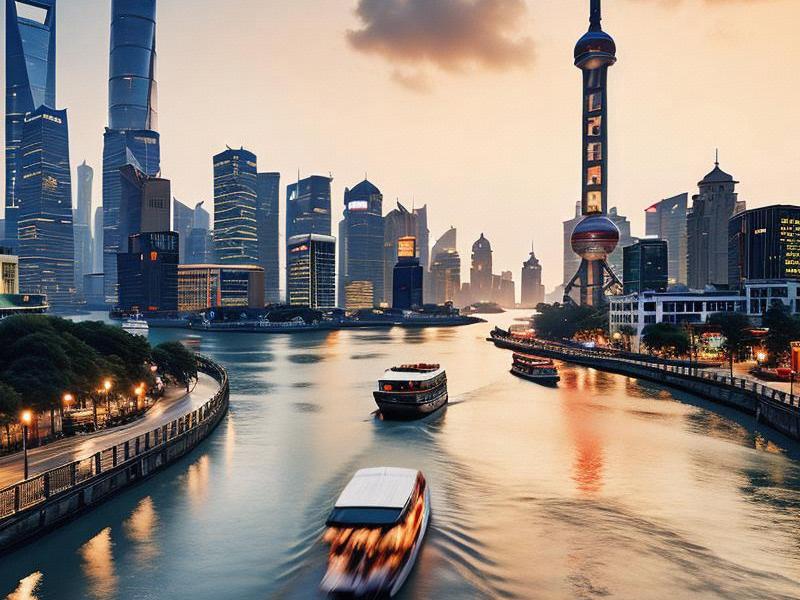This article delves into the multifaceted character of Shanghai, exploring its transformation from a traditional port city into a global economic powerhouse and cultural melting pot. It highlights the city's remarkable achievements in urban development, technological innovation, and cultural exchange, while also addressing the challenges it faces in maintaining its unique identity amidst rapid modernization.

Shanghai, often referred to as the "Pearl of the Orient," stands as a beacon of China's economic and cultural evolution. Over the past few decades, this vibrant metropolis has undergone a remarkable transformation, emerging as one of the world's most dynamic cities. Its strategic location at the mouth of the Yangtze River, coupled with its status as a major port, has made Shanghai a critical hub for international trade and commerce.
The city's skyline, a testament to its rapid urban development, is a visual representation of its economic prowess. Iconic structures such as the Oriental Pearl Tower, the Jin Mao Tower, and the Shanghai Tower dominate the skyline, symbolizing the city's aspirations and achievements. These architectural marvels are not just symbols of progress but also serve as a reminder of Shanghai's ability to blend tradition with modernity.
Shanghai's economic success is largely attributed to its status as a free trade zone and a financial center. The city is home to the Shanghai Stock Exchange, one of the largest in the world, and has attracted numerous multinational corporations and financial institutions. Its port, the busiest container port in the world, handles a significant portion of global trade, underscoring its importance in the global economy.
However, Shanghai's story is not just one of economic growth. It is also a tale of cultural diversity and exchange. As a city that has been influenced by various cultures over the centuries, Shanghai boasts a rich tapestry of traditions and customs. From the elegant French Concession to the historic Yu Garden, the city offers a glimpse into its colonial past and traditional Chinese culture.
In recent years, Shanghai has made significant strides in preserving its cultural heritage while embracing modernity. The city has invested heavily in cultural infrastructure, with world-class museums, theaters, and art galleries dotting its landscape. Events such as the Shanghai International Film Festival and the Shanghai Fashion Week attract global attention, showcasing the city's cultural vibrancy.
新上海龙凤419会所
Innovation is another hallmark of Shanghai's development. The city has been at the forefront of China's technological advancements, particularly in the fields of artificial intelligence, biotechnology, and green energy. The Zhangjiang Hi-Tech Park, often referred to as "China's Silicon Valley," is home to numerous startups and research institutions driving innovation.
Shanghai's commitment to sustainability is evident in its urban planning and green initiatives. The city has implemented various measures to reduce pollution, promote renewable energy, and enhance public transportation. The Maglev train, a high-speed magnetic levitation train, connects the city center with the international airport, offering a glimpse into the future of sustainable transportation.
Despite its many achievements, Shanghai faces several challenges in maintaining its unique identity amidst rapid modernization. The influx of people from other parts of China and abroad has led to concerns about overpopulation and housing shortages. The city's government has been working to address these issues through urban planning and the development of satellite cities.
Another challenge is preserving the city's historical and cultural heritage. As Shanghai continues to grow, there is a risk of losing its traditional neighborhoods and cultural landmarks. Efforts are being made to strike a balance between development and preservation, ensuring that the city's rich history is not lost in the pursuit of progress.
上海龙凤论坛419
Shanghai's role in global affairs is also evolving. As China's most international city, Shanghai serves as a bridge between China and the rest of the world. It plays a crucial role in promoting international cooperation and understanding, hosting numerous international conferences and events.
The city's leadership in the global arena is reflected in its initiatives to promote free trade and economic integration. Shanghai has been instrumental in the development of the Regional Comprehensive Economic Partnership (RCEP), a free trade agreement among Asian and Pacific nations. The city's efforts to strengthen ties with other major economies, such as the United States and the European Union, highlight its commitment to global economic cooperation.
Shanghai's educational institutions are also playing a vital role in shaping the city's future. Renowned universities such as Fudan University and Tongji University attract students and researchers from around the world, fostering a culture of academic excellence and innovation. These institutions are not only contributing to the city's economic growth but also enhancing its global reputation as a center of learning and research.
The city's youth are at the forefront of Shanghai's transformation, embracing new technologies and ideas that are shaping the future. Young entrepreneurs, artists, and innovators are driving change, leveraging the city's resources and opportunities to crteeaa better future for themselves and their community.
上海花千坊爱上海
Shanghai's story is a testament to the resilience and adaptability of its people. The city has faced numerous challenges over the years, from natural disasters to economic downturns, but it has always emerged stronger. This spirit of resilience is reflected in the city's motto, "Bund to the Future," which encapsulates its determination to continue growing and evolving.
As Shanghai looks to the future, it faces both opportunities and challenges. The city's leadership is committed to ensuring sustainable development, preserving its cultural heritage, and fostering innovation. By addressing these challenges head-on, Shanghai aims to remain a global leader and a model for other cities around the world.
In conclusion, Shanghai is a city that embodies the spirit of China's transformation and its aspirations for the future. Its remarkable achievements in economic development, cultural exchange, and technological innovation make it a unique and dynamic metropolis. As Shanghai continues to evolve, it will undoubtedly play a crucial role in shaping the future of China and the world.